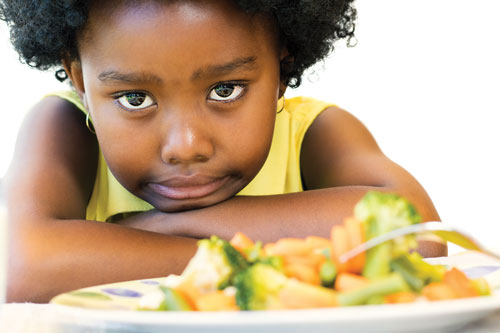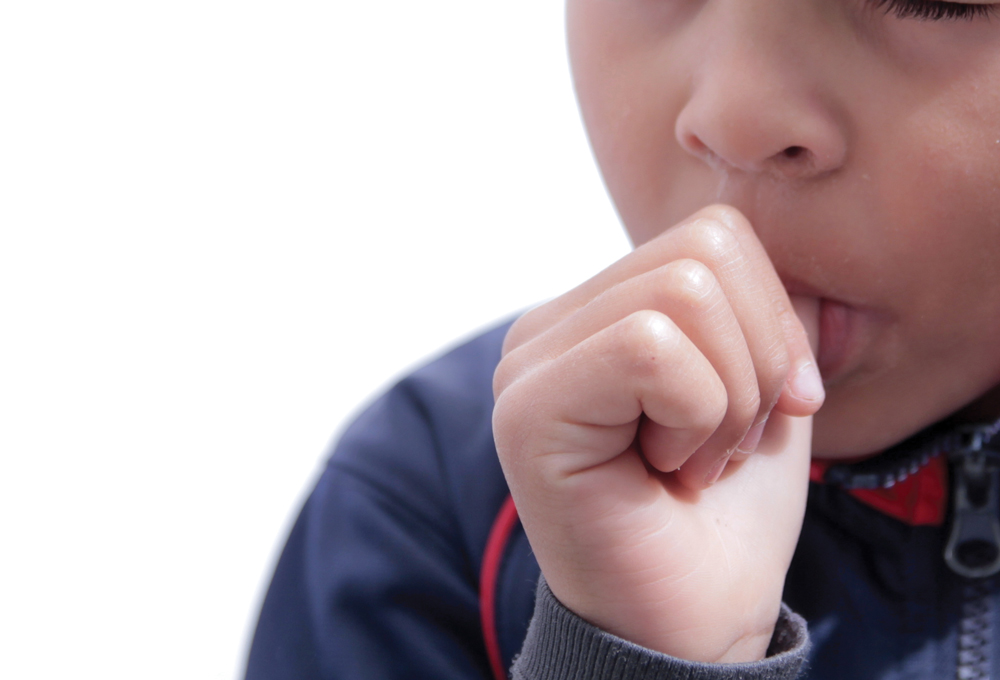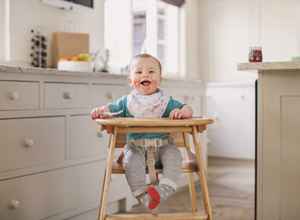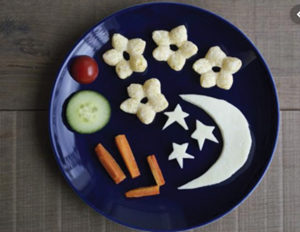
by Dr Lucy Cooke, research psychologist specialising in children’s eating behaviour and expert advisor on the non-profit children’s online game Teach Your Monster: Adventurous Eating
Getting children to eat healthily is, for many families, a daily struggle. Parents can end up cooking the same meals over and over again because their children won’t try anything new. Any attempt to serve an unfamiliar food may be met with a flat refusal and mealtimes can become a battle of wills which is stressful for everyone.
Many parents believe that everyone else’s children are eating five fruit and vegetables a day, but research tells us otherwise. In fact, less than 20% of young children meet these guidelines. Fussy or picky eating is incredibly common among young children, especially with regard to new or unfamiliar foods, and fruits and vegetables are the most likely to be rejected. Familiarity is a key driver of food intake, so the key is to make the foods we want children to eat more familiar.
One of the challenges here is that the increased consumption of ultra-processed and processed foods that are high in fat, sugar, and salt, has altered our interactions with food. As a result, some children may not even recognise ‘every day’ fruit and vegetables in their natural state.
Implementing sustainable changes can make an enormous difference to children and their families, but in practice it’s very difficult to get children to eat five fruit and vegetables a day. However, parents play a key role in increasing their child’s knowledge, awareness, and willingness to try new foods, and there are many easy-to-implement techniques and strategies that can help.
Engage your child in food preparation activities – from helping picking vegetables at the supermarket, and choosing which ones to have for dinner, to weighing, peeling, and even serving.
Eat meals together with your child whenever possible because the more a child sees parents eat and enjoy fruits and vegetables, the more likely they are to follow suit. However, avoid showing it if you don’t like fruit and vegetables as this dislike can be contagious! Try to instil calm at meal times and avoid developing a sense of expectation as that creates a stressful environment for everyone involved.
Focus on the delicious taste of fruits and vegetables rather than their healthiness. To a child, healthy food often means ‘yucky’ food so telling your child how much you enjoy fruit and vegetables is more important than saying they need it to grow fit and strong.
Persevere in the face of refusal. Offer only very small quantities of new foods at first and repeat daily for up to 10 days. Research shows this can change dislike to like.
A multi-sensory approach
If a child eats a limited range of foods and won’t even try the smallest amount of new foods, using a sensory approach to exploring foods can help lay the foundations for children to develop a better, healthier relationship with food.
Essentially, get more creative and fun with food, turn it into a game, and take it beyond the dinner table. Using all five senses: sight, sound, touch, smell, and taste is an effective way to make new food less intimidating and more familiar. Keep in mind, it’s not necessarily about eating but experiencing each one in different ways, such as:
• Look at different varieties of tomatoes and get your child to talk about the different colours, patterns, or shapes, and the difference in appearance between the inside and outside.
• Listen to the distinctive sounds created when preparing carrots using several methods such as grating, chopping, or simply biting and chewing a raw carrot.
• Touch a fruit such as an orange and feel the contrasting textures between the bumpy rind, the spongy pith, and the juicy fruit itself.
• Smell something with a strong odour such as a lemon and compare with something with little or no smell like a potato. Ask your child to describe the different smells.
• Taste a small selection of green fruit and vegetables, for instance, grapes, kiwis, cucumber, or broccoli. Cut into very small pieces and talk about whether they are sweet, or bitter, and which taste they prefer and why.
There are many such activities that parents and children can undertake together outside of meal times. For free resources try the charity TastEd (www.tasteeducation.com) which has a range of activities and videos for parents around how to use the five senses to explore food, while non-profit Teach Your Monster (www.teachyourmonster.org) has a free online game, Teach Your Monster: Adventurous Eating, which encourages children to explore food in a fun, exciting way.
Children can discover and experiment with food using all five senses, and importantly, this approach can be tailored for children of all abilities and ages. Multi-sensory interaction with food is a good way to start to tackle food fussiness, awakening curiosity, and excitement around food, and helping to inspire a generation of adventurous eaters.


 Kids love being involved with grown-up tasks, so one of the best ways to encourage a healthy relationship with food is by asking them to help out in the kitchen. Allowing them to handle the ingredients at each stage of cooking a meal helps them become more familiar with the food they’re eating, and is a great way to reduce feelings of anxiety at mealtimes.
Kids love being involved with grown-up tasks, so one of the best ways to encourage a healthy relationship with food is by asking them to help out in the kitchen. Allowing them to handle the ingredients at each stage of cooking a meal helps them become more familiar with the food they’re eating, and is a great way to reduce feelings of anxiety at mealtimes. If you’ve got the outdoor space, why not grow your own fruits and vegetables? Not only is this a fun way to teach your family about where their food comes from, but your little ones are also more likely to eat the food if they’ve grown it themselves. By the time a new ingredient is ready to plate up, your child will already be familiar with the shape and smell – all that will remain is to taste it!
If you’ve got the outdoor space, why not grow your own fruits and vegetables? Not only is this a fun way to teach your family about where their food comes from, but your little ones are also more likely to eat the food if they’ve grown it themselves. By the time a new ingredient is ready to plate up, your child will already be familiar with the shape and smell – all that will remain is to taste it! Turning mealtimes into a game is another great way to encourage your children to have a healthy relationship with food. Consider creating a rewards chart and give everyone a star for each fruit or vegetable they eat. Why not add an extra element of competition by offering a prize to whoever has the most stars by the end of
Turning mealtimes into a game is another great way to encourage your children to have a healthy relationship with food. Consider creating a rewards chart and give everyone a star for each fruit or vegetable they eat. Why not add an extra element of competition by offering a prize to whoever has the most stars by the end of Sometimes, all it takes it a little creativity to get your little ones to eat their meals, so it’s worth taking some extra time to present their dishes nicely. For example, experimenting with colour and choosing a vibrant array of vegetables served on matching tableware is a great way to make your dishes look more appetising. Add an extra touch of artistic flair by making fun faces out of the ingredients.
Sometimes, all it takes it a little creativity to get your little ones to eat their meals, so it’s worth taking some extra time to present their dishes nicely. For example, experimenting with colour and choosing a vibrant array of vegetables served on matching tableware is a great way to make your dishes look more appetising. Add an extra touch of artistic flair by making fun faces out of the ingredients. In some cases, it’s the taste and texture of vegetables that can put your little ones off eating them. So, one of the easiest ways to get your children to eat their vegetables is when they don’t know they’re there at all! This is a great way to up your family’s vitamin intake, especially if the children haven’t been swayed by your previous tactics.
In some cases, it’s the taste and texture of vegetables that can put your little ones off eating them. So, one of the easiest ways to get your children to eat their vegetables is when they don’t know they’re there at all! This is a great way to up your family’s vitamin intake, especially if the children haven’t been swayed by your previous tactics.

 At that time I’d already been vegan for seven years, I worked for the vegan campaigning charity Viva! and had a good knowledge of vegan nutrition. Despite all of this, I was still confronted with questions from others about my decision. How will your baby get their protein? Is it right to force veganism on a child? Won’t they feel left out?
At that time I’d already been vegan for seven years, I worked for the vegan campaigning charity Viva! and had a good knowledge of vegan nutrition. Despite all of this, I was still confronted with questions from others about my decision. How will your baby get their protein? Is it right to force veganism on a child? Won’t they feel left out?
 Organix weaning and finger foods help babies discover new shapes, tastes and textures, and our wide range of toddler snacks provide parents with healthier snacking options to fuel happy days.You can find heaps of further information in the Organix Baby & Toddler Cookbook which has over 70 quick and easy recipes from weaning purees to dinner time faves for the whole family to enjoy!
Organix weaning and finger foods help babies discover new shapes, tastes and textures, and our wide range of toddler snacks provide parents with healthier snacking options to fuel happy days.You can find heaps of further information in the Organix Baby & Toddler Cookbook which has over 70 quick and easy recipes from weaning purees to dinner time faves for the whole family to enjoy! amp
amp










